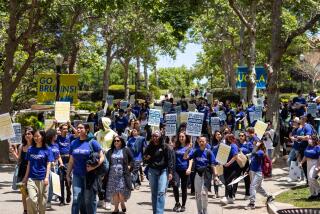How to Avoid the Freshman 15
- Share via
Health educators and dietitians serve up these pragmatic suggestions for keeping the bodies of college students healthy:
* Don’t skip meals--it just causes overeating when you finally do sit down and eat. If you’re in a rush, grab a carton of low-fat yogurt or have some skim milk and fruit. Take an apple or banana with you for a snack. Going all day without eating can also affect your personality, making you more tense, anxious and depressed.
* Allow for study calories. If you know you’re going to want to eat while studying late, have a lighter lunch and dinner. Snacks that are lower in calories include unbuttered microwave popcorn, fruit, a bowl of cereal with skim milk, even a slice or two of pizza if you skip the pepperoni and sausage. Frozen yogurt is good, but the toppings can add calories and fat.
* Have a vegetarian meal twice a week. That means lentils or beans, bean soup, rice or pasta, pasta salad. Don’t overdo meat protein--it’s not necessary for every meal.
* Use salsa, which contains no fat, on your Mexican food instead of sour cream or mounds of cheese.
* In the cafeteria avoid cream sauces, gravy, fried food or unrecognizable meat, all high in fat. Choose entrees that are grilled, broiled or baked, not fried.
* Cut down on diet sodas--no more than two cans a day. Artificial sweeteners can cause side effects, and there is evidence that they do not eliminate the body’s need for sugar. Instead, drink water, juice, flavored carbonated water, or skim or low-fat milk.
* For students on college meal plans, good choices include chopped chicken from the salad bar, light versions of traditional food, vegetables, pasta and, for breakfast, cold cereal.
* Be careful when eating from the salad bar. Too many scoops of dressing can add as much as 400 calories to an otherwise healthy salad.
* Find time for exercise. At the very least, park farther away from campus and walk to class.
More to Read
Eat your way across L.A.
Get our weekly Tasting Notes newsletter for reviews, news and more.
You may occasionally receive promotional content from the Los Angeles Times.










